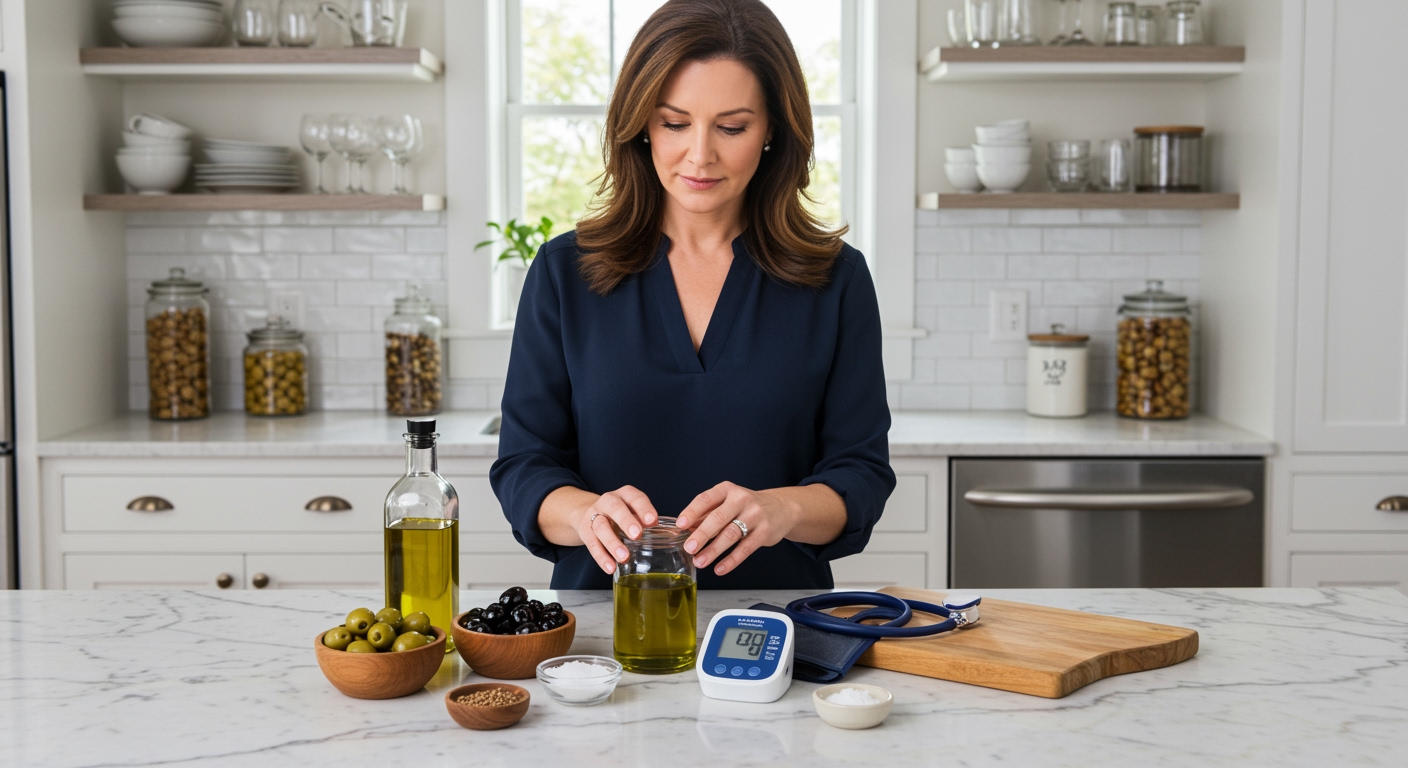✪ Key Takeaway: Olives can raise blood pressure due to their high sodium content, especially canned varieties with added salt.
Introduction
Your doctor just told you that your blood pressure is too low and you need to make some dietary changes.
You start wondering about different foods that might help raise your blood pressure naturally, and olives come to mind because of their salty taste.
Hi, I’m Abdur, your nutrition coach and today I’m going to explain exactly how olives affect your blood pressure and whether they can actually help increase it naturally.
How Do Olives Affect Blood Pressure?
Olives contain significant amounts of sodium, which directly impacts your blood pressure levels.
When you eat foods high in sodium, your body retains more water to dilute the excess salt in your bloodstream.
This increased blood volume puts more pressure on your artery walls, causing your blood pressure to rise.
The average serving of canned olives contains about 400-600 milligrams of sodium, which is roughly 25% of your daily recommended intake.
Your kidneys work harder to process this extra sodium, and they signal your blood vessels to constrict slightly to maintain proper fluid balance.
This natural response helps explain why people with low blood pressure might experience a temporary increase after eating salty foods like olives.
✪ Fact: Fresh olives straight from the tree are actually quite bitter and contain very little sodium naturally.
What Types of Olives Raise Blood Pressure Most?
Canned and jarred olives undergo a curing process that dramatically increases their sodium content.
Green olives typically contain more sodium than black olives because they require longer curing times in salt brine.
Stuffed olives with cheese, garlic, or peppers contain even higher sodium levels due to additional processing and preservatives.
Kalamata olives, despite being considered a premium variety, still pack about 300 milligrams of sodium per serving.
The brine solution used to preserve olives often contains 15-20% salt concentration, which gets absorbed into the olive flesh during storage.
Even when you rinse canned olives before eating, you only remove about 30% of the sodium content from their surface.
✪ Pro Tip: Always check the nutrition label as sodium content varies significantly between brands and processing methods.
How Much Should You Eat for Blood Pressure Effects?
A typical serving of 10-15 olives provides enough sodium to create a measurable blood pressure response in most people.
Your blood pressure typically starts rising within 30-60 minutes after consuming high-sodium foods like olives.
The effect peaks around 2-3 hours after eating and can last for several hours depending on your overall health and kidney function.
People with low blood pressure might notice improvements with just 5-8 olives, while others may need larger amounts.
Your individual response depends on factors like your current sodium intake, hydration status, and how sensitive your body is to salt.
Eating olives with other foods slows down sodium absorption, creating a more gradual blood pressure increase rather than a sharp spike.
✪ Note: Monitor your blood pressure regularly when using olives as a natural remedy to track your individual response.
Are There Any Risks to Consider?
While olives can help raise blood pressure naturally, consuming too many creates potential health risks.
Excessive sodium intake from olives can lead to water retention, bloating, and strain on your cardiovascular system.
People with kidney problems should be especially careful because their bodies struggle to process and eliminate excess sodium efficiently.
The high calorie content in olives can contribute to weight gain if you eat large quantities regularly.
Some individuals experience digestive discomfort from the high fat content in olives, especially when eaten on an empty stomach.
The temporary blood pressure increase from olives is not a long-term solution for chronic low blood pressure conditions that require medical supervision.
✪ Pro Tip: Consult your doctor before using olives medicinally if you have any underlying health conditions.
What Other Foods Work Better?
Several other foods can raise blood pressure more effectively and safely than relying solely on high-sodium olives.
Pickled vegetables like sauerkraut and pickles provide similar sodium benefits with additional probiotics for gut health.
Cheese and cured meats offer concentrated sodium along with protein and other nutrients your body needs.
Sea salt added to meals gives you more control over sodium intake while allowing you to enjoy a variety of foods.
Drinking more fluids, especially water with a pinch of salt, helps increase blood volume without relying on processed foods.
Combining multiple approaches like adequate hydration, regular meals, and moderate sodium intake creates more sustainable results than depending on olives alone.
✪ Fact: Caffeine can also temporarily raise blood pressure and works faster than sodium-based approaches.
The Bottom Line
Olives can indeed help raise blood pressure naturally due to their high sodium content, making them a potential tool for people with low blood pressure.
Smart nutrition choices require understanding both benefits and limitations of every food, and olives should be part of a broader approach rather than your only strategy.
I would love to hear about your experience with olives and blood pressure, or any questions you might have about managing low blood pressure naturally through diet.
References
At NutritionCrown, we use quality and credible sources to ensure our content is accurate and trustworthy. Below are the sources referenced in creating this article:
- Oxford Academic: Olive Oil and Hypertension Research
- About Olive Oil: Olive Oil for Hypertension
- PMC: Olive Oil and Cardiovascular Health
- Olive Oil Times: Wild Olive Oil Lowers Blood Pressure





